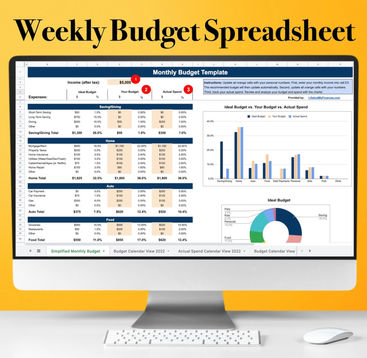The one single trick that will guarantee success with your financial goals is consistency. Building a consistent habit that keeps you accountable and puts your financial plans at the forefront of your mind every week is key to ensuring you reach your goals on time.
In this guide, we’ve put together seven quick ticks to add to your checklist each week and boost your budget - you could allocate one task to each day of the week and easily track them with our handy weekly budget template . Over time, these quick but highly impactful weekly financial wins can build into financial habits that can simplify and transform your approach to money in general.
We’ve also added an estimate of how much time each financial task will take - overall, these tasks add up to just three hours a week to completely transform your finances.
Let’s dive into the seven weekly financial wins you can add to your budget plan now and massively boost your saving success!
1. Automate Your Money
Time Spent: 15 minutes
Automation can be a game-changer in managing your personal finances, and is a task that can take as little as 15 minutes to set up and keep running behind the scenes to simplify your finances. Each week, you can simply check the automation process is running smoothly, and consider any other bills or regular expenses (including paying yourself!) that you could automate.
This simplifies the process of saving and ensures that bills are paid on time, reducing the risk of late fees and overall financial stress.
A few ways you could focus on automating your money each week to boost your budget include:
Paying yourself first: Allocate a portion of your paycheck to go directly into a savings account. This "out of sight, out of mind" approach can significantly boost your savings without any extra thought. It’s a good idea to make sure you’re putting those savings into a high-yield account, too.
Automate your bills: Set up automatic payments for recurring bills. Monitor this each week to ensure you know what is due and when, and can identify any other expenses that can be automated. Not only does this free up your time for other things, but ensuring you never miss a payment can go a long way to improving your credit score.
Investment contributions: If you're investing, consider setting up automatic contributions to your investment accounts, aligning with your risk tolerance and financial goals.
2. Track Your Small Wins
Time Spent: 30 Minutes
Small financial victories can add up to significant savings over time - and sometimes it really is the little things that matter! Tracking them can also provide a great psychological boost, keeping you motivated and financially disciplined as you enter a new week.
Examples of small wins you could track each week could include:
Daily spending: Use a budgeting spreadsheet or app to track your daily expenses. You could either do this every day, or set aside 30 minutes each week to cover the previous 7 days. This small habit can also help you identify spending patterns and areas for improvement in your budget.
Weekly savings goals: Setting yourself achievable weekly savings goals can be a great way of keeping you on track - a small weekly savings goal can feel far more manageable than setting a much higher figure for 6 or 12 months' time. Celebrate when you meet those goals each week (with a treat that doesn’t cost money!), no matter how small they seem.

Ever find yourself wondering where your money goes and why you're not hitting your savings goals? Well, wonder no more! With our handy weekly budget template, you can track every cent.
Not only can you track your spending, but the spreadsheet will tell you the ideal budget based on your income and how you're doing in comparison. Charts and graphs give a clear visual breakdown of your spending and progress.
Available for Excel, Google Sheets, and Numbers, download the spreadsheet now to get a handle on your weekly budget!
3. Look Out For Discounts
Time Spent: 10 Minutes
A fantastic frugal living habit to get into is to keep an eye out for discounts and coupons each week, especially if you know you have to make certain purchases in the months ahead (whether that’s for flights for a vacation, a new big purchase such as a car or household furniture, or seasonally for Christmas, for example).
With the internet at our fingertips, keeping a pulse on discounts available to you is easier than ever. Here are a few great hacks to come back to each week:
Coupon apps and websites: Utilize apps and websites such as Ibotta, Honey, Rakuten, and Flipp each week. All of these are fantastic platforms that offer coupons and promo codes for everyday purchases and can go a long way in boosting your budget with great savings.
Loyalty programs: Sign up for loyalty programs at stores you frequently visit. Signing up isn’t necessarily a weekly financial task - but monitoring what each program is offering, where you’re signed up, and potential discounts available is a small but quick win to get into the habit of.
4. Organize Your Receipts
Time spent: 45 minutes
Keeping your receipts organized each week helps in tracking spending, managing returns, and preparing for tax season. Starting this habit now and keeping on top of it each week will change your life if you’re the type of person to leave admin tasks like this to the last minute!
A few great tips to make organizing your receipts that bit easier include:
Digital scanning: Use a scanning app such as Fetch to keep digital copies of receipts, reducing paper clutter. Many of these apps even let you earn points for every receipt you scan which can be exchanged for gift cards.
Categorize your receipts: Organize your receipts into categories (e.g. groceries, utilities, entertainment) each week, which makes it easier to review your spending habits and file your tax return in the future if needed.
5. Plan Your Meals
Time spent: 40 minutes
Meal planning is a simple yet effective way to reduce food expenses, which is a common financial drain for many households. Creating a weekly master shopping list with your meals planned out for the week helps to minimize food waste, eliminate spontaneous purchases, and prevent impulsive eating out.
For effective meal planning and budgeting, there are a few great weekly habits you can tick off your financial checklist:
Weekly meal plans: Plan your meals for the week and make a grocery list accordingly. This helps avoid buying items you don't need, and has the added benefit of aiding healthier eating habits as well as being more budget-conscious.
Cook in batches: Some people have great success in preparing meals in batches and freezing them. Bulk buying and prepping meals saves time and money - you could set aside a Sunday afternoon, for example, and prepare a low-cost dinner to last days.
6. Do One Thing To Boost Your Budget
Time spent: 10 minutes
Each week, write out one small thing you’ll do to boost your budget. It could be not buying coffee out all week, no takeouts, or putting an extra $25 in your savings account, for example.
It can be a small goal for the week, but something that you wouldn’t normally do to make an impact on your financial goals.
While this weekly habit might seem like it has a small effect on your overall savings goals, it can be a fun way to see how your habits impact your finances, and keep you motivated for more long-term changes.
7. Schedule A Financial Check-In
Time spent: 30 minutes
Scheduling weekly financial check-ins can keep you accountable and on track with your financial goals. It’s a short but intentional meeting with yourself to go over your budget, your spending for the week, and address anything that stands out to you from the past week.
This can be a truly transformative weekly habit to add to your checklist of things to do, giving you the time and space you need to make your budget a priority this year.
To conduct a financial check-in each week, you could cover tasks such as:
Reviewing your budget: Regularly reviewing your budget to ensure you're sticking to it and making adjustments as needed is a great weekly habit, keeping your savings goals firmly at the forefront of your actions.
Assess savings and other financial goals: You could also take a few minutes each week to evaluate your financial goals and track your progress towards them. For example, if you have a savings goal to save a certain amount by a specific date, measuring your progress each week ensures that goal doesn’t slip by unnoticed.
Plan for upcoming expenses: Your weekly financial check-in can also be a good time to look ahead and plan for any upcoming expenses, setting aside funds if necessary. This could be for things such as holidays, birthdays, vacations, or big expenses you know are likely to arise in the near future.
Start Boosting Your Budget
Remember, the key to financial success is consistency and mindfulness. These weekly habits will ultimately keep your financial goals at the forefront of your mind, reducing the likelihood of your financial plans being pushed down in your priorities as day-to-day life takes over.
Tailor these tips to your lifestyle and watch your budget grow week on week - you’ll be amazed at how far you’ve come a year from now!
If you want to start making small changes that will lead to big financial wins, download the weekly budget template today and map your journey to success!


.jpg)



